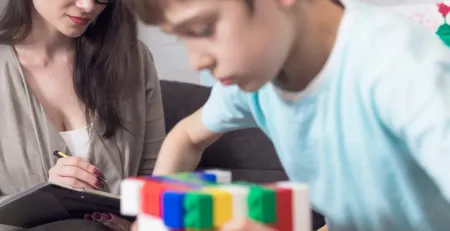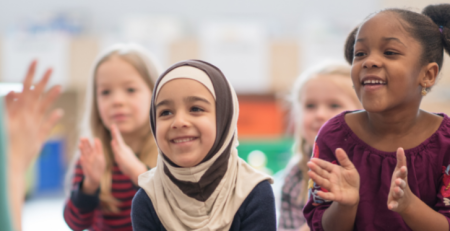The unique psychological needs of gifted and talented students
The National Association of Gifted and Talented Students (NAGC), states that students with gifts and talents perform—or have the capability to perform—at higher levels compared to others of the same age, experience, and environment in one or more domains. However, gifted and talented students may also face unique challenges with respect to their psychological development ranging from perfectionism and competitiveness to issues making friends.
Dr. Gail Post is a clinical psychologist who specializes in working with gifted and talented children and adults. We sat down with Dr. Post to discuss some of these specific challenges and how best to support the psychological development of gifted and talented students.
This interview has been edited for length and clarity
Please tell us a little bit about your background as a Clinical Psychologist, specifically related to your experience with giftedness.
Dr. Post: I am a Clinical Psychologist, parenting consultant, workshop leader, and writer. In practice for over 35 years, I provide psychotherapy in the Philadelphia area and within PSYPACT-affiliated states. I am also an Associate Professor of Psychiatry at the University of Pennsylvania School of Medicine. While I continue to work with adults and adolescents experiencing a range of concerns, I have developed a specialization in working with the needs of the intellectually and musically gifted. I also provide parenting consultations and workshops with schools and parenting groups. My writing includes online articles, several book chapters, a long-standing blog, (Gifted Challenges), and a new book through Gifted Unlimited Press, “The Gifted Parenting Journey: A Guide to Self-discovery and Support for Families of Gifted Children,” available in Fall, 2022, which explores the needs of parents of gifted children
Why did you decide to get involved in this area of expertise?
Dr. Post: When I started in private practice, I became aware of how many highly accomplished clients struggled with similar concerns, such as perfectionism, overthinking, anxiety, and impatience with others who don’t “get it.” I became even more aware of the impact of giftedness when I advocated for my children at their school. I joined and eventually co-chaired a gifted parents advocacy group, where we worked to create changes in how giftedness was identified and how gifted services were implemented. When my children graduated, I wanted to continue advocacy efforts, given the widespread misunderstanding and stigma gifted children, their parents, and gifted adults experience. This led to writing about the social/emotional aspects of giftedness, providing workshops to parents and schools, and offering parent consultations to address concerns related to their gifted children (such as grade acceleration, strategies for working with the schools, or college planning).
What common misconceptions or challenges do you believe gifted children face in school?
Dr. Post: Some teachers, administrators, school board members, and parents within the community minimize the impact of giftedness, claiming these children do not need enriched services. Families who advocate for their children may be labeled as overinvolved or elitist and insensitive to academically struggling students’ needs. There are widespread assumptions that gifted children will “do just fine on their own,” and some are relegated to “tutoring their peers” (often a recipe for further alienation from their peer group), or they merely receive additional busywork to occupy their time. As a result, gifted children may become disillusioned with school, exhibit behavioral problems, or underachieve. Some gifted children present with “twice exceptional” conditions; they are intellectually gifted but struggle with psychological or learning-related problems that limit their engagement with school or their ability to achieve academically. Examples include learning disabilities, Autism Spectrum Disorder (ASD), or Attention-Deficit/Hyperactivity Disorder (ADHD). Many gifted children with these conditions are never identified as gifted because their diagnoses mask their innate abilities.
On the other hand, some receive little support for twice exceptional conditions because their intellect allows them to “get by” just enough to remain unnoticed. For example, a gifted child with ADHD might perform at grade level; their distractibility limits their ability to concentrate, but their giftedness aids their performance just enough so that their difficulties are never identified. Both their ADHD and their giftedness are overlooked.
Giftedness is often conflated with achievement, and gifted underachievers are sometimes refused services because they did not earn high enough grades. Let’s keep in mind that no other exceptionality would be denied the specialized learning instruction they needed because they were struggling in school. I am not trying to blame the teachers, though. Many are overworked and face large classes where children exhibit various behavioral and learning needs. They may be expected to differentiate instruction—an impossible task given the diversity of learning needs within a typical classroom. Many have not received training in gifted education or the needs of gifted students. Like all people, they may hold assumptions and stereotypes based on their personal or educational experiences.
What are some of the main differences in the emotional needs a gifted child may present compared to their non-gifted peers?
Dr. Post: Many (although not all) gifted students present with heightened sensitivity, intensity, and a desire for fairness and social justice. This creates a situation where they may be highly reactive to emotionally or socially challenging interactions and feel frustration or even despair if they believe someone was mistreated. Some gifted children are perfectionistic and feel demoralized if they are not the best. Many gifted children exhibit asynchronous development, where their strengths and skillsets vary, or their social maturity lags far behind their intellectual abilities. But most of all, if their intellectual abilities are not challenged, they will become bored and resentful and react emotionally – through inertia, underachievement, despair, or rebellion.
What is the best way for a school psychologist to help gifted students in conjunction with gifted specialists?
Dr. Post: The school psychologist is ideally situated to support and advocate for gifted students. They can advocate for universal screening and insist on offering individualized cognitive testing to those suspected as gifted (as opposed to utilizing classroom achievement tests that many schools rely on because of financial constraints). They can educate staff about the essential need for enriched and accelerated instruction and the emotional aspects of giftedness. They can advocate within the school district for ability grouping, clustering, and acceleration as necessary options for these students. They can support parents’ understanding of giftedness and guide them toward appropriate resources. They can also provide groups for gifted children or supervise staff who run these groups. And they can support gifted specialists when they feel overwhelmed in their work with intense, energetic, and emotionally sensitive gifted children and help them identify strategies for addressing behavior problems or heightened emotions and reactivity.
However, all of the above suggestions assume that the school psychologist will be allotted time in their schedule to provide these services. None of these activities can be accomplished without support from school administration for school psychologists to use a portion of their time to support the needs of gifted students.
How can we best set up gifted students for success as they move on from the school environment?
Dr. Post: Ideally, gifted students will have progressed through a school environment where they thrived academically, found meaningful interests, engaged in challenging projects and activities, and felt good about themselves and within a group of like-minded peers. When they feel understood, valued, and challenged, they are much more likely to invest energy into school, appreciate their accomplishments, and envision a fulfilling career path. Independent study, dual enrollment, an immersion in an area of interest, self-advocacy skills, and improved executive functioning skills will enhance their confidence.
Gifted students also need guidance when choosing pursuits after graduation. For many, this will involve higher education, and gifted students need guidance when choosing a college best suited for their needs. Yes, most students can find their niche at any college. However, colleges differ widely, and gifted students will thrive at a college that challenges them intellectually, offers meaningful extra-curricular activities, and provides a social environment where they feel accepted and understood.
Any final thoughts?
Dr. Post: Gifted students are built to tackle advanced, challenging, stimulating academic work. It is distressing that so many schools hold them back; whether due to budgetary or philosophical constraints, gifted children are rarely offered the challenging learning experience they crave. There is a false assumption that gifted students require little input from staff or that providing more challenging work somehow harms other children with different learning needs. Much work is still needed to dispel stigma and misunderstanding and educate the public and school administrators about the needs of the gifted.
To learn more about MHS’ Gifted and Talented offerings click here.










